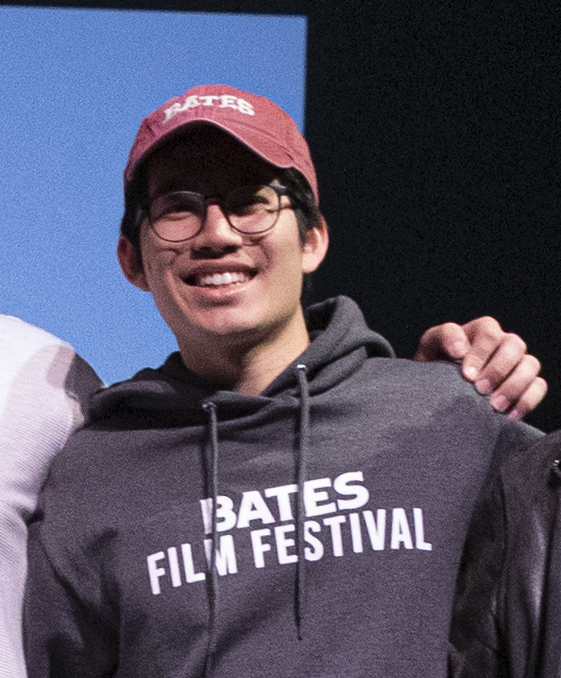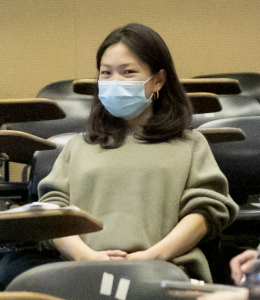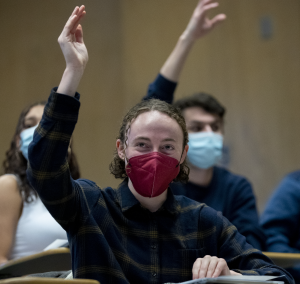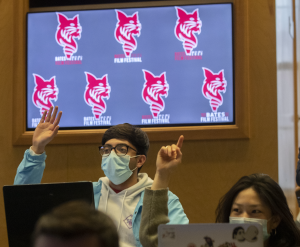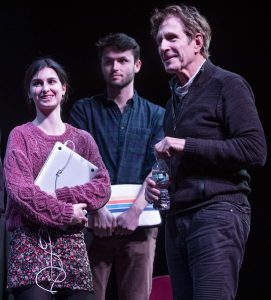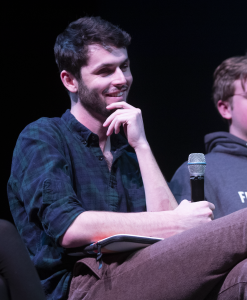By Oliver Wan (BFF 2022, Bates Class of 2022)
The course “Film Festival Studies” led by Professor Cavallero was one that I thoroughly enjoyed. As an Environmental Studies major that only minored in Film Studies, I felt somewhat underprepared for the course. In all honesty, I had little to no idea what a film festival even was! I was under the assumption that this would be a course that was just about film festivals. I didn’t know that I would be acting as a board member for a festival. On the first day of class after hearing Professor Cavallero’s goals for the semester, I was highly intrigued by the entire concept. I was excited that the course focused on creating a learning environment that was all about the experience of going to the movies. And I was anxious to see how BFF attendees would react to an event that was the result of the decisions we made and the work we did throughout the course. By the end of the semester, I felt that the skills and lessons that I developed went way beyond the class and the field of Film Studies. They provided great insights that will prove beneficial to me in the near future.
“In all honesty, I had little to no idea what a film festival even was! I was under the assumption that this would be a course that was just about film festivals. I didn’t know that I would be acting as a board member for a festival.”
One of our major tasks was selecting the films for the festival. The class was divided into two teams – one focused on documentaries and the other focused on fictional narratives. I was on the narrative team. It was a wonderful experience to screen films with my peers and then discuss the reasons why we believed the movie fit or didn’t fit our festival. When debating which films fit best, I remember reflecting on the literature that we had read for the course. Nick Roddick points out that every festival has a theme and hopes to be able to provide audiences with opportunities to explore and celebrate the kind of cinema that “falls outside the everyday fare of the multiplex” (2013). These points helped me to understand that picking films for the festival was not solely about films that would be tied to our mission statement; it was also about being able to facilitate and inspire fruitful conversations that would enlighten everyone who might be interested in the topic. I distinctly remember a point in the class when we were debating a film. We were hesitant to select the movie because it contained controversial content. It was only after a long discussion that we realized that a controversial screening might help to generate conversations around topics that need to be addressed. I believe that it was experiences like this that helped me to learn best. By debating films and their relevance to the BFF, I was able to better understand that the “best movie” is not always the “right movie” for a festival. There are many reasons to screen a film, and there were a variety of factors that led to our BFF festival selections.
“By debating films and their relevance to the BFF, I was able to better understand that the ‘best movie’ is not always the ‘right movie’ for a festival.“

For me, another highlight from this experience was the opportunity to organize my own panel. In the middle of the course, we were tasked with pitching a panel idea to the class. We were allowed to create a panel on any topic of our liking, and because the documentary team selected The New Corporation as one of their films, I felt that it would be fitting if we did a panel on climate change. Since the film focuses on major corporations, I thought it would be interesting to analyze the intersections between climate change and corporate responsibility. They are fields that are in some ways complementary and in others antagonistic. After finalizing my topic, Professor Cavallero suggested individuals I might invite. During the festival, I found myself moderating a panel with Susana Hancock, a Rhodes scholar, polar climate researcher, and policy analyst! I prepared questions for the discussion, and I believe the resulting conversation was constructive and informative, especially since it inspired robust conversations between individuals with different perspectives. I hoped for a bigger audience, but I still found it rewarding to see a project I conceived and pitched come to life over the course of the semester.

When looking back on the semester, all I can think about is how I loved the format of this class and how it has created such a unique way to learn. I believe that the “Film Festival Studies” class is a great model for what learning can be. Through taking the class, I actively participated in and led initiatives that created opportunities for growth for me, my peers, and festival attendees. I am incredibly grateful to have been a part of it.
Works Cited
Roddick, Nick. “Coming Soon to a Server Near You: The Film Festival in the Age of Digital Reproduction.” In The Film Festival Reader, edited by Dina Iodanova. 173-190. St. Andrews: St. Andrews Film Studies, 2013.

